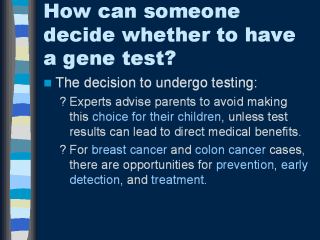 |
In addition, unless test results can lead to direct medical benefits, experts
advise parents to avoid making this choice for their children. For most
adult-onset conditions, knowing a child's genetic status will not affect the
course of the disease or its treatment. The decision to have a gene test should
be left to the individual, at a time when he or she is mature enough to weigh
the options and handle the results.
Because the issues are so complex and so new, and the consequences so profound,
the decision to have a genetic test deserves careful preparation and thought.
One pivotal consideration concerns whether or not any action might be prompted
by the test. If the test is positive, are there opportunities for prevention or
early detection?
The decision is especially wrenching for persons confronted with a disease that
can be neither prevented nor cured. In one such situation, Huntington's disease,
many families initially expressed interest in being tested; however, when the
test actually became available, just a tiny fraction chose to go ahead with it.
The story may be different for breast and colon cancer, where there are
opportunities for prevention, early detection, and treatment. Indeed, early
experience from a breast cancer gene research program indicated that most of the
people who had donated samples for DNA testing chose to learn the results.
|
